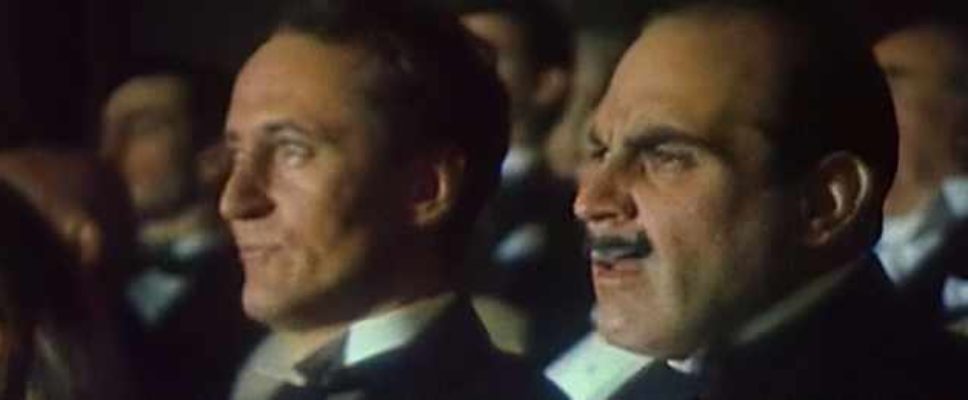Teresa Reviews “The Third Floor Flat” (1989)
Fidelity to text: 4 guns.
![]() The changes fleshed out a skimpy story and improved the victim’s motivations. They added Miss Lemon as ministering angel, the play The Deadly Shroud, and a few changes to the characters. We also get a far more dramatic chase scene at the climax.
The changes fleshed out a skimpy story and improved the victim’s motivations. They added Miss Lemon as ministering angel, the play The Deadly Shroud, and a few changes to the characters. We also get a far more dramatic chase scene at the climax.
Quality of movie on its own: 4 guns.
![]() Everything worked beautifully, and you get a really nice set of interiors for Poirot’s apartment building, including its inner workings. What didn’t I like? How the film and Poirot treated Mildred, Pat’s friend.
Everything worked beautifully, and you get a really nice set of interiors for Poirot’s apartment building, including its inner workings. What didn’t I like? How the film and Poirot treated Mildred, Pat’s friend.
 We open with Poirot shrouded under a towel, breathing in steam. He’s got a dreadful cold, all’s wrong with the world, and he needs stimulation to keep his little gray cells from deteriorating still further. Hastings suggests they see a mystery play, The Deadly Shroud.
We open with Poirot shrouded under a towel, breathing in steam. He’s got a dreadful cold, all’s wrong with the world, and he needs stimulation to keep his little gray cells from deteriorating still further. Hastings suggests they see a mystery play, The Deadly Shroud.



The play and the new neighbor do not improve Poirot’s cold or his concern about losing his faculties. What he needs is a murder.
That evening while Poirot and Hastings are watching the badly written play, so are two couples: Pat and Donovan and Mildred and Jimmy. Conveniently, they’re attending the same production, giving them something to discuss later on.
Poirot and Hastings come home from the theater, Poirot complaining about idiot playwrights who don’t play fair with the audience, and that his cold has grown worse.

The gentlemen arrive in Pat’s kitchen, but the kitchen light doesn’t work. They move into the next room, turn on the light, and make the shocking discovery that they are not in Pat’s flat. The lads miscounted, and they’re in the flat below. More shockingly, the flat is occupied by Ernestine Grant, dead, blood on the floor. The police are called.
Since Poirot lives in Whitehaven Mansions, he naturally steps in to see what’s going on.

It’s so convenient when the murderer leaves obvious clues to his identity at the scene of the crime. Almost like a badly written play, one would say.
Looking back on the episode, it’s readily apparent that Poirot figured out almost immediately who had done what. Motivations and proof took longer to work out. Watch for his misdirection: it’s classic Poirot.
The denouement includes the villain’s very self-serving sob story. Keep in mind as you watch that we only have his word for what happened. We have no idea what Ernestine Grant would have done after moving into the flat underneath Pat’s flat. We know only one thing for sure and that is that Ernestine Grant moved into the building that day, only to be shot that evening. We have no proof of anything else the murderer claims.
Apart from the story, there’s plenty of moments to appreciate. The theater scenes are especially engaging, with the hammy acting and beautifully dressed patrons enjoying the scenery chewing. The day Ernestine Grant moves in, there’s an old lady operating a tea stand in front of Poirot’s building selling tea to the movers. We meet her again when the villain steals Hastings’ beloved Lagonda motorcar and crashes it into her tea stand. Miss Lemon, doing her darnedest to get Poirot to breathe in helpful steam. Long-suffering Inspector Japp, managing nosy neighbors, needs proof and not speculation.
What didn’t I like? How Mildred, Pat’s friend was treated. She’s an average-looking brunette. She’s a good friend; that’s clear from the opening scenes with Pat. They double-date at the theater. Pat goes with Donovan who wants to marry her, while Mildred’s date is Jimmy.
Unfortunately, Pat is a hot, vivacious blonde whereas Mildred is an average-looking, sedate brunette. So for that matter is Ernestine Grant. You know what that means in Hollywood. Ernestine Grant’s fate is to serve as murder victim. Mildred’s fate is to vanish from the second act even though she must be living with Pat! Why isn’t she on the scene after the murder, right below Pat’s flat is discovered? Because no matter what Hollywood likes to claim about diversity, sedate, average-looking brunettes don’t count.
They count so little that when the murderer’s motivation is revealed, Poirot asks Jimmy about his interest in Pat. Not Mildred, the woman he escorted to the theater. No, it’s Pat who was planning to marry Donovan. Pat needs Jimmy’s strong, manly support during the upcoming trauma of the police investigation, newspaper coverage, and trial. Mildred doesn’t just vanish from the scene. She loses her friend and her boyfriend.
But average-looking brunettes with unattractive names don’t rate happy ever afters. Those are reserved for hot, vivacious blondes. Average-looking brunettes remain spinsters and adopt a lot of cats as they age, alone, because they don’t rate a husband unless they dye their hair blonde.
If you don’t have a problem with this issue, you’ll enjoy The Third Floor Flat. If you do, brace yourself for what happens to Mildred. That’s show business.

